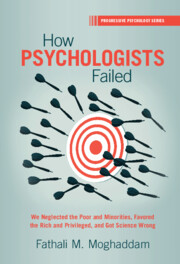‘In this fascinating and provocative book, Moghaddam addresses two persistent biases in mainstream psychology: reductionism and determinism. These biases function systematically to conceal and misattribute collective disadvantage, Moghaddam compellingly argues. By centering collective processes and normative contexts, psychological science will discern and challenge poverty and injustice. A great read!’
Winnifred Louis - University of Queensland, Australia
‘This book is an intellectual feast from an intellectual force. In compelling detail, Moghaddam shows how the context of our lives affects the way we think, feel, and behave. Our health and happiness, the way we live and die, are determined by our surroundings. We ignore the conditions of our lives at our own peril. If we want to improve our lives, relationships, workplaces, and the world, we must stop believing in the meritocratic myth. Moghaddam tells us how to stop deluding ourselves and how to start promoting wellness, fairness, and worthiness. Compulsory reading, not just for psychologists, but for everyone concerned with our collective fate.’
Isaac Prilleltensky - Author of How People Matter: Why it Affects Health, Happiness, Love, Work, and Society
‘In this tour de force, Moghaddam exposes the limits of individualized psychology and illuminates how economic inequity and social class affect issues such as mental health, educational performance, and injustice. This eye-opening book should be required reading for psychology students and psychologists.’
Michael Wessells - Columbia University, USA
‘The author's encouragement provides a path for psychologists to rethink what they bring to their research and to their advocacy. For those in their early career who want to chart a path forward that has a significant potential for positive impact, this book is essential reading. … Highly recommended.’
R. E. Osborne
Source: Choice



